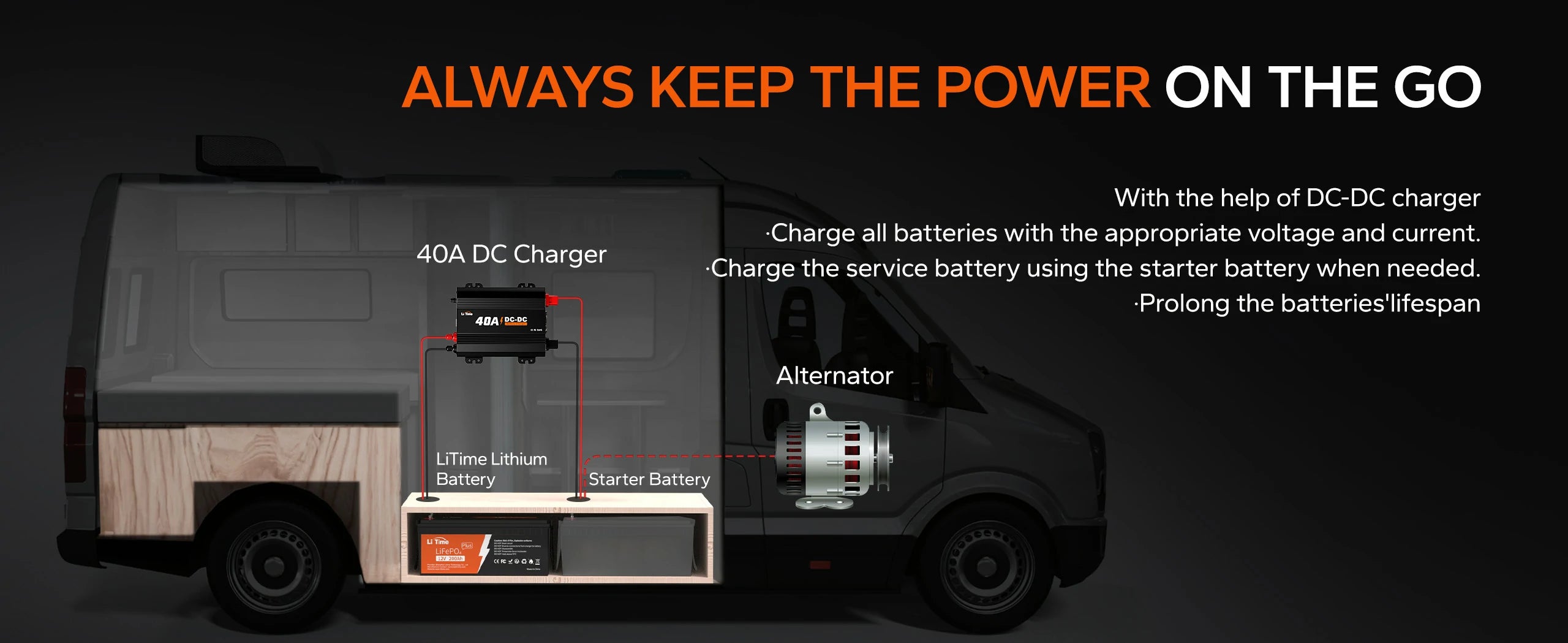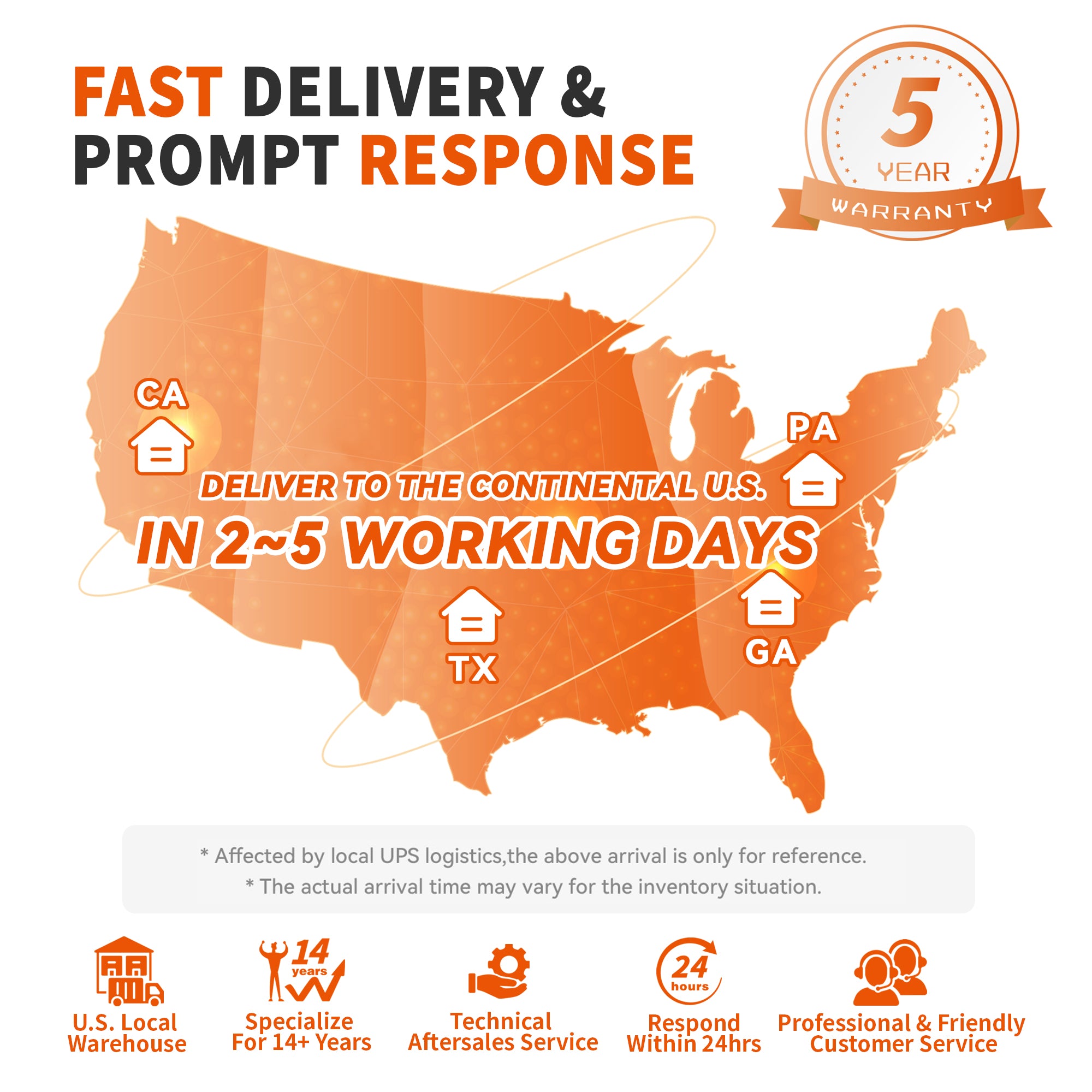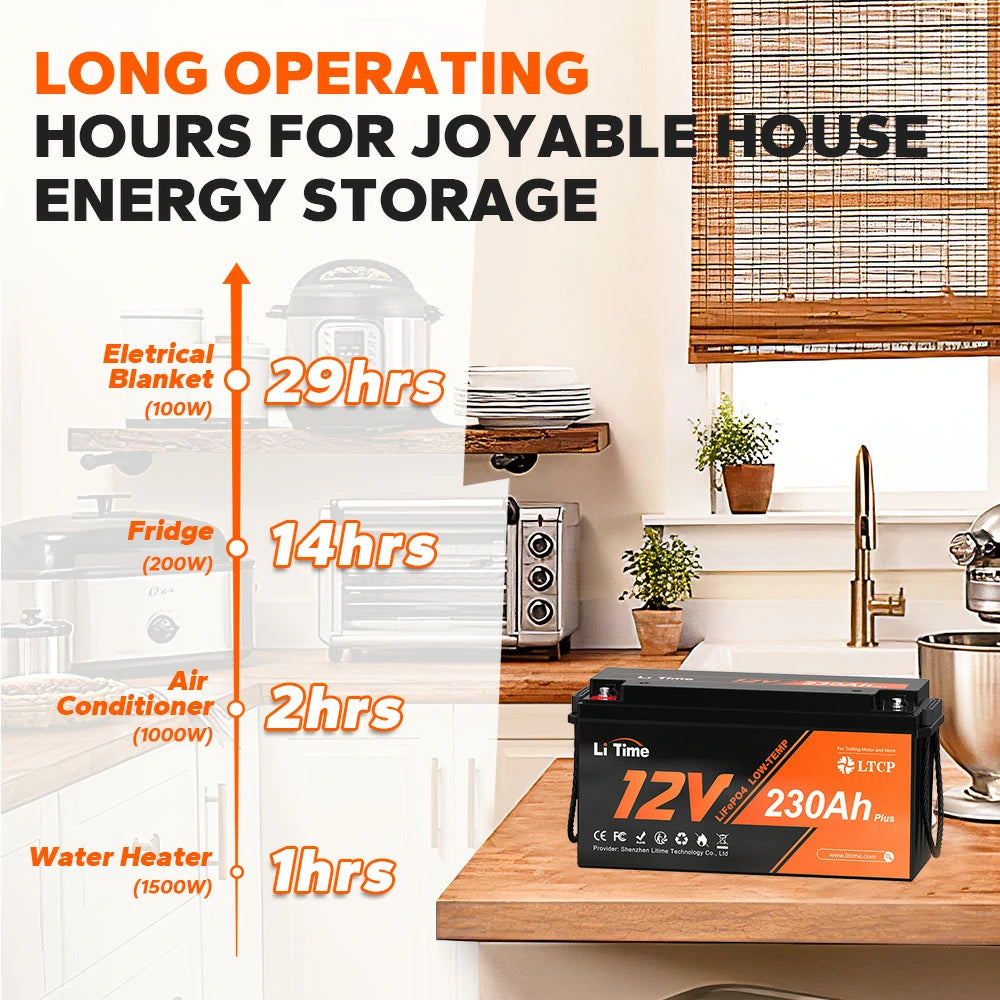Setting off on an off-grid journey with your RV can create lasting memories. It allows you to break away from your everyday routines and fully embrace the natural surroundings.
Yet, to ensure an optimal experience, having an off-grid solar battery to support your appliances during periods when your solar system isn't actively generating power, like during the night, is crucial. However, the real challenge lies in selecting the most suitable battery for your off-grid setup.
This article delves into the different kinds of RV batteries that are worth considering for your off-grid solar system. Additionally, it sheds light on why LiTime RV batteries stand out as the ideal choice for dry camping.
Table of Content
- Part 1: The Purposes of RV Leisure Batteries
- Part 2: Types of RV Deep Cycle Batteries & Why Lithium The Best
- 2.1 Lead-Acid Battery
- 2.2 Gel Batteries
- 2.3 Lithium-Ion Batteries
- 2.4 AGM VS Lithium RV Batteries: Full Comparison
- Part 3: Considerations When Selecting an RV Battery
- Part 4: 4 Best Lithium Batteries for RV
- Part 5: Why Choose LiTime's RV Batteries?
The Purposes of RV Leisure Batteries
Leisure batteries, often used in recreational vehicles (RVs), are designed to provide a steady supply of power for appliances and devices when the vehicle is not running. These batteries are different from car batteries, which are primarily designed to provide a burst of energy to start the engine.

RV leisure batteries are deep-cycle batteries, meaning they are built to provide a steady amount of power over an extended period. They are capable of being discharged and recharged multiple times without significantly affecting their lifespan or performance. This makes them ideal for powering appliances such as lights, refrigerators, televisions, and other electronic devices commonly found in RVs.

An RV battery serves multiple purposes, including:
- Powering Appliances: RV batteries are essential for running various appliances such as lights, water pumps, refrigerators, and entertainment systems when you are not connected to shore power.
- Storing Solar Power: In off-grid situations, RV batteries store the energy generated by solar panels for use during periods when sunlight is not available.
- Providing Backup Power: RV batteries can serve as a backup power source in case of emergencies or when shore power is unavailable.
- Operating Slide-Outs and Leveling Systems: Many modern RVs have slide-outs and leveling systems that are powered by the RV battery.
In essence, RV batteries are crucial for providing power to essential systems and appliances, making them indispensable for both off-grid adventures and regular RV use.
Types of RV Deep Cycle Batteries & Why Lithium The Best
There are several types of deep cycle batteries commonly used in RVs, each with its own advantages and disadvantages. The most common types include:
1. Lead-Acid Batteries:
- Flooded Lead-Acid: These are the traditional, most affordable, and widely used deep cycle batteries. They require regular maintenance and ventilation due to off-gassing of hydrogen during charging.
- AGM (Absorbent Glass Mat) Lead-Acid: These are sealed lead-acid batteries that require less maintenance and are more resistant to vibration and shock.
2. Gel Batteries:
Gel batteries are also sealed lead-acid batteries, but they use a gelified electrolyte. They are maintenance-free and can handle deep discharges well.
3. Lithium-Ion Batteries:
Lithium-ion batteries are becoming increasingly popular in RVs due to their high energy density, longer lifespan, lighter weight, and faster charging capabilities. They also have a higher depth of discharge (DoD) compared to lead-acid batteries, meaning you can use more of their capacity without damaging them. Additionally, they require minimal maintenance and have a longer cycle life compared to lead-acid batteries.

LiTime 12V 100Ah Group 24 Lithium Battery
AGM VS Lithium RV Batteries: Full Comparison
AGM is the most popular RV battery in the market, what’s the differences between AGM adn lithium? Let’s take a full comparison.
Depth of Discharge (DoD):
- AGM: Typically allows a depth of discharge of around 50%, exceeding which could damage the battery.
- Lithium: Offers a higher depth of discharge, over 80% and even 100% without harming the battery. Consequently, this means that a lithium battery of the same capacity provides twice the available energy compared to an AGM battery.
Lifespan:
- AGM: With life cycles around 300-500, the lifespan of AGM batteries can range from 3 to 5 years.
- Lithium: Lithium batteries often have a longer lifespan, for example, LiTime lithium batteries offer life cycles of 4000-15000, ranging from 10 to 15 years of service.
Size and Weight:
- AGM: AGM batteries are generally heavier compared to lithium batteries. A 12V 100Ah AGM battery weighs around 63-70lbs.
- Lithium: Lithium batteries are renowned for their compact size and lighter weight. A LiTime 12V 100Ah Group 24 Lithium battery weighs only 21 lbs.
Energy Density:
- AGM: A Group 24 AGM battery has an energy density of around 7.23Wh/lbs.
- Lithium: A Group 24 lithium battery offers a higher energy density at 60.95Wh/lbs.
Charge Time and Efficiency:
- AGM: AGM batteries generally have longer charge times and lower charge efficiency compared to lithium batteries. It would take around 8 hours to fully charge the battery.
- Lithium: Lithium batteries can be charged more quickly and with higher efficiency compared to AGM batteries. Most lithium batteries support 0.2C charging, for example, to charge a 12 volt 100Ah lithium battery, the recommended charging Amp is 20A, taking 5-6 hours to fully charge. Some lithium batteries like LiTime Group 24 smart lithium battery support 1C charging, taking only 1-2 hours to fully charge.

Related reading: Lithium Battery Charging Speed:Slow Charging VS Fast Charging
Maintenance:
- AGM: AGM batteries typically require minimal maintenance but may need occasional equalization charging and should be kept at full charge when not in use.
- Lithium: Lithium batteries require minimal maintenance and do not need regular equalization charging.
Environmentally Friendly:
Both AGM and lithium batteries are recyclable and offer environmentally friendly options, but lithium batteries have a slight advantage due to their higher energy density and longer lifespan, resulting in fewer batteries needing to be recycled over time.
Safety:
- AGM: AGM batteries are generally considered safe but can release hydrogen gas if overcharged or improperly maintained.
- Lithium: Lithium-ion batteries do not generate gas accumulation and contain no toxic liquids, allowing for their use without additional safety precautions. Furthermore, lithium batteries are equipped with a BMS (Battery Management System) to provide protection.
Bluetooth Technology:
Lithium batteries like LiTime Group 24 smart and GC2 golf cart batteries incorporate Bluetooth technology, enabling you to monitor your battery's status at any given time. This feature provides direct access to vital information, including remaining charge, voltage levels, temperature, and more, offering peace of mind and control over your power requirements.

Initial Cost:
Lithium-ion batteries entail a higher initial investment compared to AGM batteries. Although AGM batteries are more cost-effective upfront, when assessing the lifetime cost, lithium-ion batteries prove to be the superior choice due to their significantly longer lifespan and superior performance across various parameters.
|
Characteristic |
AGM Battery |
Lithium Battery |
|
Depth of Discharge (DoD) |
Typically around 50% |
Over 80% and even 100% without damage |
|
Lifespan |
300-500 life cycles, 3-5 years |
4000-15000 life cycles, 10-15 years |
|
Size and Weight |
Heavier, e.g., 12V 100Ah: 63-70 lbs |
Lighter, e.g., 12V 100Ah: 21 lbs |
|
Energy Density |
Around 7.23Wh/lbs |
60.95Wh/lbs |
|
Charge Time and Efficiency |
Longer charge times, lower efficiency |
Faster charging, higher efficiency |
|
Maintenance |
Minimal, occasional equalization charging |
Minimal, no regular equalization charging |
|
Environmentally Friendly |
Recyclable, slightly lower energy density |
Recyclable, higher energy density, longer lifespan |
|
Safety |
Considered safe, may release hydrogen gas |
No gas generation, no toxic liquids, with BMS |
|
Bluetooth Technology |
Typically not included |
Included, enables real-time monitoring |
|
Initial Cost |
Lower initial cost |
Higher initial cost, superior lifetime cost |
Considerations When Selecting an RV Battery
When choosing an RV battery, several key factors should be taken into account:
1. Longevity
The durability of a battery significantly affects its lifespan and performance. For instance, lithium batteries can endure up to 10 years and sustain approximately 4000-15000 cycles of charge and discharge before experiencing a decline in performance. In contrast, lead acid batteries typically last about 2-3 years and can withstand around 200-750 cycles of charge and discharge before a reduction in performance.
2. Power Output
To determine the most suitable battery capacity for your needs, it's essential to calculate your daily energy consumption. This involves listing the power-consuming appliances in your RV and their power capacity to establish your total daily energy usage.
After multiplying each power capacity by the estimated hours of usage for each appliance and factoring in an additional 10-20% for inefficiencies and losses during charging or discharging cycles, you can divide the total daily energy consumption by the battery's voltage to ascertain the necessary capacity. This step ensures you acquire the appropriate battery capacity for your RV, particularly if you frequently travel to remote areas.
3. Rechargeability
Consider how effectively the battery retains a charge and the time it takes to recharge. Typically, lithium batteries maintain a charge for a longer duration than lead-acid batteries and require less time for recharging. These factors directly influence the optimization of the battery's performance.
4. Cost and Warranty
When shopping for an RV battery, it's important to align the selection with your budget. Lithium-ion batteries tend to be the most expensive, while flooded batteries are generally the most economical. Additionally, it's advisable to review the product warranty, as this reflects the manufacturer's confidence in the battery's durability.
For instance, LiTime Lithium batteries come with a 5-year warranty, indicating a high level of confidence in their longevity and performance.

Best Lithium Batteries for RV
1.LiTime 12V 100Ah Group 24 Lithium Battery
Weight: 21lbs
The LiTime 12V 100Ah Group 24 lithium battery boasts a 41% higher Volumetric Energy Density (VED) while occupying only 75% of the volume compared to the LiTime 12V 100Ah Group 31 battery. Furthermore, it weighs one-third less than a Group 24 AGM battery, offers an 8X Mass Energy Density (MED), and delivers 100% energy (1280Wh).
In contrast, the standard Group 24 AGM battery provides a mere 70Ah capacity with 420Wh of usable output at 50% DOD, while the Group 24 lead-acid battery releases only 50% of its energy at 100% DOD.

2.LiTime 12V 100Ah Group 24 Smart with Bluetooth
Weight: 21lbs
Features with Bluetooth function so you can easily monitor the battery status through your phone.
What’s more, the Group 24 smart is built-in the advanced 100A battery management system (BMS) which has 20+ protections and warnings, majorly including smart Bluetooth, low-temp charging cut-off protection, over-voltage protection, low-voltage protection, over-current protection with auto recovery function, over-temp protection, low-temp protection, short-circuit protection, overload protection and pre-charging function with 30mF capative load, which enable it to operate stably, intelligently and safely.
3.LiTime 12V 230Ah Deep Cycle Lithium Battery
Weight: 45.22 lbs
The 12V 230Ah lithium battery is a powerhouse designed for extended performance and versatility. With a remarkable 2560W power and 2944Wh of usable energy, this battery is primed to support approximately 3kWh of daily home or off-grid use, as well as a full day of power for fishing, RV, or camping activities.
Not stopping there, this battery offers an impressive 47.104kWh Energy Expansion, allowing for a maximum 4P4S configuration to construct a robust 51.2V 920Ah battery system. Its support for 200A current makes it ideal for a range of applications, including 12V trolling motors (30-70 lbs), marine vessels, RVs, as well as UPS and backup power systems.
Ensuring reliability in diverse conditions, the battery incorporates Low-Temperature Cut-Off Protection, which intelligently halts charging below 0°C/32°F and disconnects loads below -20°C/-4°F, safeguarding against potential damage during cold weather operation.
Safety is paramount with the inclusion of a high-performance 200A BMS (Battery Management System) board, which offers comprehensive protection against over-charging, over-discharging, over-current, over-temperature, and short-circuit scenarios, guaranteeing a secure and dependable power solution for a variety of applications.

4.LiTime 24V 100Ah Deep Cycle Lithium Battery
Weight: 45.59lbs
If you have a large RV that needs 24 volts battery system, then the 24V 100Ah lithium battery is a better choice since you don’t need connect 2 12 volt lithium battery in series.
A single LiTime 24V 100Ah lithium battery equals two 12V 100Ah lithium batteries. 24V higher voltage and 2.56kWh energy, supports up to 4P2S connection to make a 48V 400Ah battery bank of 20.48kWh energy, enabling you to build your battery system with easier operation and are perfect as backup power.

Why Choose LiTime's RV Batteries?
Selecting LiTime's RV batteries offers a range of compelling advantages:
Affordability
LiTime stands out as a provider of tech-driven and best budget RV batteries, ensuring high-quality and efficient power solutions at a wallet-friendly price point.
Versatility
LiTime offers RV batteries in a variety of capacities, spanning from 50Ah, 100Ah, 200Ah, to 460Ah, catering to diverse individual requirements.
Whether you seek extended boondocking adventures or shorter trips, LiTime has an RV battery with the perfect capacity for your needs.
Durability
The longevity of LiTime's lithium batteries is directly linked to their Depth of Discharge (DOD), ensuring extended operating hours and sustained performance.
Safety
Employing lithium iron phosphate, known for its safety and resilience, LiTime manufactures its lithium batteries using this material, providing enhanced durability and protection during usage.
Innovative Features
LiTime batteries boast an advanced and innovative design, tailored to withstand rugged environments and harsh weather conditions. Additionally, an optional rugged battery box crafted from polypropylene, complete with ventilation holes and a securing strap, ensures easy installation and protection for your RV battery.
Advanced Functionality
Featuring cutting-edge attributes such as a battery saving mode and Bluetooth capabilities, LiTime batteries offer the added benefit of accessing daily power reports, enhancing your overall experience.
Warranty and Support
LiTime offers a five-year warranty on lithium batteries, coupled with round-the-clock customer service to address any concerns or inquiries promptly.
Visit LiTime Youtube Reviews for more information about LiTime batteries.
Frequently Asked Questions (FAQs)
1.How long will a RV battery Last?
Typically, depending on your power usage, boondocking can be sustained for a period ranging from 2 to 7 days. However, the duration largely hinges on the type of batteries you employ. Inefficient batteries with limited charge-holding capacity can significantly curtail your trip. Therefore, it is crucial to select the most suitable battery to meet your specific requirements. Here’s an example:
|
Equipment (Typical example) |
Current (Amps) |
Multiply by |
Hours of use |
= |
Amp hour rating (AH) |
|
One fluorescent tube |
0.75 |
x |
5 |
= |
3.75 |
|
2 halogen lights |
1.50 |
x |
3 |
= |
4.50 |
|
LCD TV |
2.5 |
x |
4 |
= |
10.00 |
|
TV booster |
0.05 |
x |
4 |
= |
0.20 |
|
Water pump |
0.7 |
x |
0.5 |
= |
0.35 |
|
Motor mover |
30 (Average) |
x |
0.3 |
= |
9.00 |
Sub Total | = | 27.8 (For winter use, add an extra 10%)
Add 20% safety margin | = | 5.56
Total Ampere Hours required per day | = | 33.36
So if you have a 100ah battery, it would last 3-4 days.
2.How to charge RV batteries?
There are 3 recommended ways to charge lithium RV batteries,
- LiFePO4 battery charger
- Solar Panel
- Generator
Read on The Best Ways to Charge Lithium LiFePO4 Batteries for more details.
3.What’s the difference between a car battery and an RV battery?
Car batteries are designed for starting the engine and providing short bursts of high power. They are usually referred to as "starting batteries" or "cranking batteries." RV batteries, on the other hand, are often deep cycle batteries designed to provide a steady amount of power over a longer period of time. They are built to withstand deep discharges and recharges, making them suitable for powering appliances and electronics in an RV.
Related reading: Starting VS Deep Cycle Battery
Conclusion
In the pursuit of the best lithium battery for an RV, it's essential to consider factors such as capacity, lifespan, charging capabilities, and overall performance. By choosing a high-quality lithium battery that aligns with your specific power requirements and RV setup, you can enhance your travel experiences with reliable and sustainable energy storage. Whether it's for boondocking adventures or extended road trips, the right lithium battery can truly elevate your RV lifestyle.








